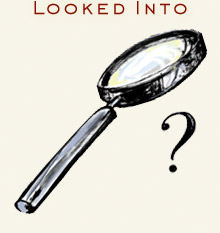Emdashes—Modern Times Between the Lines
The Basics:
About Emdashes | Email us
Ask the Librarians
Best of Emdashes: Hit Parade
A Web Comic: The Wavy Rule
Features & Columns:
Headline Shooter
On the Spot
Looked Into
Sempé Fi: Cover Art

Engaging piece about John Ashbery by Meghan O'Rourke in Slate:
John Ashbery wrote his first poem when he was 8. It rhymed and made sense ("The tall haystacks are great sugar mounds/ These are the fairies' camping grounds") and the young writer—who had that touch of laziness that sometimes goes along with precocity—came to a realization: "I couldn't go on from this pinnacle." He went on, instead, to write poems that mostly didn't rhyme, and didn't make sense, either. His aim, as he later put it, was "to produce a poem that the critic cannot even talk about." It worked. Early on, a frustrated detractor called him "the Doris Day of Modernism." Even today a critic like Helen Vendler confesses that she's often "mistaken" about what Ashbery is up to. You can see why: It simply may not be possible to render a sophisticated explication de texte of a poem that concludes "It was domestic thunder,/ The color of spinach. Popeye chuckled and scratched/ His balls: it sure was pleasant to spend a day in the country."
No wonder Ashbery is widely thought of as dauntingly "difficult"—or, in some camps, as something of a literary hoaxster. It would be a shame, though, if this prevented curious readers from picking up his books. Being difficult, after all, is not the same thing as being incomprehensible.
Read the rest here.
For me, and for at least one other person I know, getting something out of Ashbery—getting a lot out of Ashbery—came with hearing him read. He stood there at the podium of the Morgan Library looking as genial and harmless as Ed McMahon, and his words were calm and paced, not the verbal whirlpool of someone who's trying to put something over on you. It was something like a reading by the late Kenneth Koch, but not theatrical (Ken was theatrical in the best way—his presence was a French circus, like the entire cast of The Rules of the Game in one person). As Ashbery read, paused, and just barely accented certain phrases, I understood that his poems simply expressed states of mind in interestingly juxtaposed groups. And that made them more than not-baffling; it let me focus on the words instead of the structure, on reacting to those states of mind rather than being mad at Ashbery for being so elusive or worrying about metaphor. It was a simple but key change, and I'm now happy to see his poems both "narrative" (as if all stories have a beginning, middle, and end, and explainable characters) and not. I'm thinking about Andy Goldsworthy's willed natural events and how they tell a story of sorts—he throws a fistful of red dirt into a creek and watches it rush with color, for example, or watches a cairn undo itself in the ocean over time—and how enough of those in close proximity might resemble an Ashbery poem (O'Rourke calls him a "radio transistor"). If this seems like so much red dirt, just read aloud one of his poems, or better yet, let him do it for you.
The Instruction Manual: How to read John Ashbery [Slate]
The Natural: The Poetry and Madness of John Clare [New Yorker; quotes Ashbery essay at length]
Nancy Drew's Father: The Fiction Factory of Edward Stratemeyer [O'Rourke, New Yorker]



